Corey Redekop's Blog, page 38
February 4, 2012
Monkey droppings - Pontypool Changes Everything by Tony Burgess
Today, the monkey puts on his spelunking gear and slowly lowers himself into the depths of another's psychosis.
Going really deep into this one. I can see stalactites hanging from the roof of his ego. And there's bat guano everywhere.
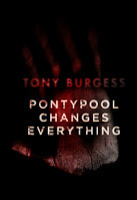 Pontypool Changes Everything (ECW Press, 1998: Chizine, 2010)
Pontypool Changes Everything (ECW Press, 1998: Chizine, 2010)
by Tony Burgess
But I'd never want to be trapped inside his mind.
Burgess is one of the preeminent Canadian masters of literary horror, that vague subset of the horror genre where the story is told just too damn well to be relegated to (he writes with a sniff of derision) mere "horror." Dean Koontz has never even seen literary horror from his perch (nor do I believe he knows of its existence). Stephen King stops by on occasion (although it's been a while). Clive Barker visits frequently. Burgess has his own gazebo on the lawn, where he sits sipping absinthe from a silver cup.
Burgess's specialty is dropping insanity into the most mundane of surroundings. Basing many of his works in smalltown Ontario, Burgess excels at delving into that madness that peeks out the corners of everybody's eyes. In People Live Still in Cashtown Corners, its the gas jockey who decides that arbitrary murder is the best way to go. In Ravenna Gets , the populace of Ravenna decides en masse to destroy the populace of nearby Collingwood. In Idaho Winter (his first YA book), a young boy goes on a rampage after learning he's a character in a book.
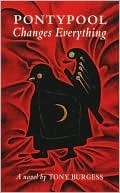 Pontypool Changes Everything (hereinafter PCE) is ostensibly a zombie novel, yet relegating it to that qualification does it as much a disservice as assuming
Moby Dick
to be a book about whaling, Naked Lunch to be about drugs, and To Kill a Mockingbird to be about racism. The labels are superficially correct, but completely missing the point.
Pontypool Changes Everything (hereinafter PCE) is ostensibly a zombie novel, yet relegating it to that qualification does it as much a disservice as assuming
Moby Dick
to be a book about whaling, Naked Lunch to be about drugs, and To Kill a Mockingbird to be about racism. The labels are superficially correct, but completely missing the point.
The plot of PCE defies easy summation; like David Lynch's Mulholland Drive — and if there are any two artists whose combined talents would result in the freakiest , most disturbing story ever put to film, it's these two — PCE weaves through reality and fantasy without distinction between the two, physically pushing at the reader's concepts of linear narrative as dreamlike imagery takes hold. Make no mistake, reading Tony Burgess takes effort, an effort many people will be unwilling to take (wimps). Leave them to their safe little zones, their Bentley Littles and Robin Cooks; yeah, I'm not a fan. There is no safe ground in Burgessland. Everything shifts, and if you think you're safe and steady, the world is about to drop out from beneath you. His words are slivers beneath your fingertips, burrowing in and refusing to budge.
Burgess's zombies are not the now-standard grabby and bitey undead of innumerable b-grade movies (although, to be fair, they do grab and bite on occasion). To start, the virus is not transmitted by blood, or saliva, or radiation, but through language:
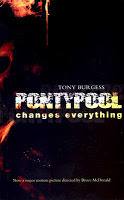 There are two sections to PCE: in the first, "Autobiography," we follow a man who may or may not become a zombie himself stumble through the beginnings of a plague, intent on rescuing the newborn son he's never met. His reality mingles with detached flights of hallucination, and by the end, I'm not even sure there was a son. The second section, "Novel," tells the story of the zombie plague itself, and how it begins to affect the people of Ontario.
There are two sections to PCE: in the first, "Autobiography," we follow a man who may or may not become a zombie himself stumble through the beginnings of a plague, intent on rescuing the newborn son he's never met. His reality mingles with detached flights of hallucination, and by the end, I'm not even sure there was a son. The second section, "Novel," tells the story of the zombie plague itself, and how it begins to affect the people of Ontario.
Sometimes, it's hard to even justify what you are reading as anything more than being weird for weird's sake (not that there's anything wrong with that). Yet even if PCE were to be thoughtlessly shoved into the 'bizarro' genre of literature — a serious literary genre that combines satire and absurdism with non-traditional narratives and crazy-weird plot devices: while it has a fan in sci-fi/fantasy grand master Michael Moorcock, whose acclaimed Jerry Cornelius series could be classified as bizarro, the genre is usually populated with titles such as The Ass Goblins of Auschwitz , Gigantic Death Worm , Squidpulp Blues , and Unicorn Knife Fight — it would still stand head and shoulders above its peers. Burgess is a fine writer, and his prose oozes menace while following an inner logic that virtually demands repeated readings.
 Burgess is never going to be to everyone's taste; like I said, he demands some work on the part of the reader, like most artists do. If your taste leans toward a relatively undemanding horror where vampires sparkle and werewolves solve crimes, stay away; if you've replayed
Lost Highway
more time than you can count, wondering how Bill Pullman transmogrified into Balthazar Getty, you'll undoubtedly love Pontypool.
Burgess is never going to be to everyone's taste; like I said, he demands some work on the part of the reader, like most artists do. If your taste leans toward a relatively undemanding horror where vampires sparkle and werewolves solve crimes, stay away; if you've replayed
Lost Highway
more time than you can count, wondering how Bill Pullman transmogrified into Balthazar Getty, you'll undoubtedly love Pontypool.
Verdict: The Monkey Loves, Although His Head Hurts a Bit
P.S.
Going really deep into this one. I can see stalactites hanging from the roof of his ego. And there's bat guano everywhere.
 Pontypool Changes Everything (ECW Press, 1998: Chizine, 2010)
Pontypool Changes Everything (ECW Press, 1998: Chizine, 2010)by Tony Burgess
At a breakfast table in Caesarea a couple sits across from each other. Their mouths are open and liver coloured. She tries to lick her bottom lip but misses, catching her tongue in the slippery well of skin at the base of her gums. The tongue pushes to a point in this pocket until the O of her lips reaches its limit and the tongue springs out, releasing a full pouch of liquid down her chin. Her husband mimics this, but he extends his tongue directly through the O, clearing its edges, missing the point.
I know Tony Burgess. I like Tony Burgess. He's a good guy, easy to approach. Affable, even.Like all the other zombies, the only expression that these two can achieve is one of supernatural failure. Like gargoyles, they frown in exhausted masks of hopelessness. Her eyes rise into the bridge of her nose and tunnel up beneath her brow; the lashes have fallen into the tails of goldfish that fan across her cheeks. His eyes are the same, but for heavier lower lids that scoop out like wading pools, vividly red and beating with vulnerable membrane.
But I'd never want to be trapped inside his mind.
Burgess is one of the preeminent Canadian masters of literary horror, that vague subset of the horror genre where the story is told just too damn well to be relegated to (he writes with a sniff of derision) mere "horror." Dean Koontz has never even seen literary horror from his perch (nor do I believe he knows of its existence). Stephen King stops by on occasion (although it's been a while). Clive Barker visits frequently. Burgess has his own gazebo on the lawn, where he sits sipping absinthe from a silver cup.
Burgess's specialty is dropping insanity into the most mundane of surroundings. Basing many of his works in smalltown Ontario, Burgess excels at delving into that madness that peeks out the corners of everybody's eyes. In People Live Still in Cashtown Corners, its the gas jockey who decides that arbitrary murder is the best way to go. In Ravenna Gets , the populace of Ravenna decides en masse to destroy the populace of nearby Collingwood. In Idaho Winter (his first YA book), a young boy goes on a rampage after learning he's a character in a book.
 Pontypool Changes Everything (hereinafter PCE) is ostensibly a zombie novel, yet relegating it to that qualification does it as much a disservice as assuming
Moby Dick
to be a book about whaling, Naked Lunch to be about drugs, and To Kill a Mockingbird to be about racism. The labels are superficially correct, but completely missing the point.
Pontypool Changes Everything (hereinafter PCE) is ostensibly a zombie novel, yet relegating it to that qualification does it as much a disservice as assuming
Moby Dick
to be a book about whaling, Naked Lunch to be about drugs, and To Kill a Mockingbird to be about racism. The labels are superficially correct, but completely missing the point. The plot of PCE defies easy summation; like David Lynch's Mulholland Drive — and if there are any two artists whose combined talents would result in the freakiest , most disturbing story ever put to film, it's these two — PCE weaves through reality and fantasy without distinction between the two, physically pushing at the reader's concepts of linear narrative as dreamlike imagery takes hold. Make no mistake, reading Tony Burgess takes effort, an effort many people will be unwilling to take (wimps). Leave them to their safe little zones, their Bentley Littles and Robin Cooks; yeah, I'm not a fan. There is no safe ground in Burgessland. Everything shifts, and if you think you're safe and steady, the world is about to drop out from beneath you. His words are slivers beneath your fingertips, burrowing in and refusing to budge.
Burgess's zombies are not the now-standard grabby and bitey undead of innumerable b-grade movies (although, to be fair, they do grab and bite on occasion). To start, the virus is not transmitted by blood, or saliva, or radiation, but through language:
The virus had hid silently for decades up in the roofs of adjectives, its little paws growing sensitive, first to the modifications performed there: then, sensing something more concrete pulling at a distance, the virus jumped into paradigms. It was unable to reach the interior working of the paradigm, however, due to its own disappearance near the core. The viruses bit wildly at the exterior shimmer of the paradigms, jamming selection with pointed double fangs. A terrible squealing ripped beneath the surface of the paradigms as they were destroyed. The shattered structure automatically redistributed its contents along syntagma, smuggling vertical mobiles across horizontal ropes. What was in the air had to travel as ground and the virus sauntered right into these new spaces, taking them over. Radical spaces evolved to compensate. Negative space became a fortune telling device. Positive space arched its back painfully, now pocked horribly by the frenzied migration of vehicles into the ground.
The plague first manifests itself in the infected person as a type of déjà vu, with an accompanying aphasia. Everything that happened presented itself as already happened. This infinitely complicated things. For as soon as the person adjusted, understanding that this was merely a symptom of the plague, his or her understanding slipped backward into the already happened. Each realization had to be doubled against itself into becoming understood next: an impossible therapy to maintain. The present tense was a slippery slope to anyone in remission. The "now" became a deepening lesion, and from it rose the smell of this new sickness.
 There are two sections to PCE: in the first, "Autobiography," we follow a man who may or may not become a zombie himself stumble through the beginnings of a plague, intent on rescuing the newborn son he's never met. His reality mingles with detached flights of hallucination, and by the end, I'm not even sure there was a son. The second section, "Novel," tells the story of the zombie plague itself, and how it begins to affect the people of Ontario.
There are two sections to PCE: in the first, "Autobiography," we follow a man who may or may not become a zombie himself stumble through the beginnings of a plague, intent on rescuing the newborn son he's never met. His reality mingles with detached flights of hallucination, and by the end, I'm not even sure there was a son. The second section, "Novel," tells the story of the zombie plague itself, and how it begins to affect the people of Ontario.This is only a brief summary, as, like Lynch at his most mind-bending, Burgess resists a traditional narrative structure in favour of scenes that insinuate themselves into your medulla, and images that by turns fascinate and horrify. Other characters flit about, their importance to the story nebulous at best. One character may or may not be a ghost, or demon, or angel. Two children flee their parents and hide in an abandoned cabin, whereupon they commence to live an existence that would surely get the book summarily banned should those with weak temperaments and even weaker grasps of art versus reality ever read the book (not much chance there).On September 7 strange new edicts are passed in the Ontario legislature with more hand-washing than wringing. and by late afternoon the instructions are handed over to heavily armed teams. They are directed to exercise maximum force immediately. To combat contagion all form of communication is banned. Speaking, listening, reading, even sign language are punishable at the brute discretion of Ontario's own licensed assassins. Citizens are instructed to stay at home and communicate only through nods or shakes of the head.
Sometimes, it's hard to even justify what you are reading as anything more than being weird for weird's sake (not that there's anything wrong with that). Yet even if PCE were to be thoughtlessly shoved into the 'bizarro' genre of literature — a serious literary genre that combines satire and absurdism with non-traditional narratives and crazy-weird plot devices: while it has a fan in sci-fi/fantasy grand master Michael Moorcock, whose acclaimed Jerry Cornelius series could be classified as bizarro, the genre is usually populated with titles such as The Ass Goblins of Auschwitz , Gigantic Death Worm , Squidpulp Blues , and Unicorn Knife Fight — it would still stand head and shoulders above its peers. Burgess is a fine writer, and his prose oozes menace while following an inner logic that virtually demands repeated readings.
 Burgess is never going to be to everyone's taste; like I said, he demands some work on the part of the reader, like most artists do. If your taste leans toward a relatively undemanding horror where vampires sparkle and werewolves solve crimes, stay away; if you've replayed
Lost Highway
more time than you can count, wondering how Bill Pullman transmogrified into Balthazar Getty, you'll undoubtedly love Pontypool.
Burgess is never going to be to everyone's taste; like I said, he demands some work on the part of the reader, like most artists do. If your taste leans toward a relatively undemanding horror where vampires sparkle and werewolves solve crimes, stay away; if you've replayed
Lost Highway
more time than you can count, wondering how Bill Pullman transmogrified into Balthazar Getty, you'll undoubtedly love Pontypool.Verdict: The Monkey Loves, Although His Head Hurts a Bit
P.S.
Published on February 04, 2012 10:53
January 29, 2012
Goose Lane celebrates with a terrific sale!
I don't normally shill for others (aw, who am I kidding?), but the good folks at Goose Lane Editions, Canada's oldest independent publisher, are celebrating a new website launch with some fabulous deals on amazing books!*
From the press release:
*NOTE: I am, in fact, two online personas, Corey Redekop and the shelf monkey. As Corey Redekop, I am Goose Lane's publicist, so I am, of course, prejudiced toward them and therefore cannot be trusted when I say that these are beautiful books that are easily worth your time. But the monkey? He chooses no sides, but he knows a good deal when he sees one. And he says to not let people know of an opportunity for a sale copy of YOU comma Idiot would be a crime.
From the press release:
FOR IMMEDIATE RELEASE
Goose Lane Editions launches new website
[Fredericton, NB] In 1994, still in the birthing years of the Internet, Goose Lane Editions, Canada's oldest independent book publisher, made history by becoming one of the first publishing houses in the world to launch their own website. After 18 years, the site has gone through numerous transformations, changing to suit our evolving culture as technology improved and users became more computer-savvy. Now, we are proud to announce the newest iteration of www.gooselane.com, with new features, new content, and a new promotion to kick off the launch.
In addition to a complete visual redesign, we have added new website elements such as twitter feeds and ongoing blog posts by our many employees. Sample chapters are available for many books, and an ongoing stream of events and notices is added to the main page every day.
To celebrate our launch, we'd like to extend a special offer. For every day the week of January 30, we will be offering one book a day at a special highly-discounted price. Roadsworth, YOU comma Idiot, The Famished Lover, Miller Brittain, The Black Watch, Beaverbrook: A Shattered Legacy, and Ganong: A Sweet History of Chocolate will each take over one day of the week with a drastically discounted price to help celebrate our new look and attitude. All this, in addition to our regular feature of free shipping on orders of $60 or more. To take advantage of these offers, simply create an account with Goose Lane. By doing so, you'll also ensure that you are regularly updated on upcoming special offers.
We've been around a long time, both physically and electronically. Here's to many more years together.
*NOTE: I am, in fact, two online personas, Corey Redekop and the shelf monkey. As Corey Redekop, I am Goose Lane's publicist, so I am, of course, prejudiced toward them and therefore cannot be trusted when I say that these are beautiful books that are easily worth your time. But the monkey? He chooses no sides, but he knows a good deal when he sees one. And he says to not let people know of an opportunity for a sale copy of YOU comma Idiot would be a crime.
Published on January 29, 2012 10:12
January 22, 2012
Favourite Monkey #1:
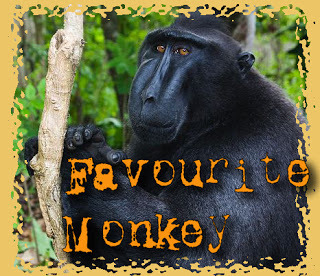 wherein the shelf monkey commences upon a historic, nay, histrionic, nay yet again,
monumental
attempt to re-read and internetally review those most-beloved works of fiction that have nestled firmly within his psyche, an effort spanning the entirety of his entirely too-short life thus far.His favourite books, in other words. Good god but this primate is tremendously verbose for someone who sleeps in a tree.Today's exciting episode:
wherein the shelf monkey commences upon a historic, nay, histrionic, nay yet again,
monumental
attempt to re-read and internetally review those most-beloved works of fiction that have nestled firmly within his psyche, an effort spanning the entirety of his entirely too-short life thus far.His favourite books, in other words. Good god but this primate is tremendously verbose for someone who sleeps in a tree.Today's exciting episode:
Stone Junction
by Jim Dodge
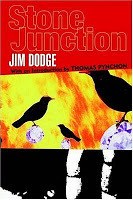
Plot synopsis (from Goodreads):
Stone Junction is a novel about Daniel Pearse, an orphaned child who is taken under the wings of the AMO - Alliance of Magicians and Outlaws. An assortment of sages sharpen Daniel's wide-eyed outlook until he has the concentration of a card shark Zen master, via apprenticeships in meditation, safecracking, poker, and the art of walking through walls. This unconventional education sets Daniel on the trail of a strange, six-pound diamond sphere, held by the U.S. government in a New Mexico vault, rumored to be the Philosopher's Stone or the Holy Grail. Shadowing the slippery netherworlds of role-playing games like Magic or Dungeons & Dragons, Daniel's quest to retrieve the magic stone and discover who killed his mother becomes a bravura act of storytelling, both a free-spirited adventure and a parable about the powers within us all.When did the shelf monkey first read this? I recall purchasing Stone Junction from the University of Winnipeg bookstore, from a sales table. I was undoubtedly in my twenties. Picked it on a whim, the cover and copy intrigued me.
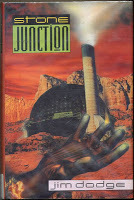 What were the first impressions? Stone Junction grabbed me like few books ever have. For years I considered it my favourite novel of all time.
What were the first impressions? Stone Junction grabbed me like few books ever have. For years I considered it my favourite novel of all time. How many times has the shelf monkey read this? This, I believe, is my fourth reading.
Has it withstood the perils of time and maturity? Oh, yes, and then some.
New thoughts: Thomas Pynchon calls Stone Junction "a celebration of everything that matters." Forgetting for a moment that a blurb from Pynchon is akin to the Pope's personal blessing for many people, it's a fine summation of Stone Junction's many, many endearing qualities. Jim Dodge has penned a rollicking joyride of a story down the backroads and dark alleys of a mythical American landscape that cannot possibly exist, yet should. I'm not a conspiracy nut by any means, but the idea of a semi-legendary affiliation of outlaws and magicians that subtly weaves itself through history is so tempting, it's no wonder one edition begins with a warning: "This book is a work of fiction. FICTION. Believe otherwise at your own peril."
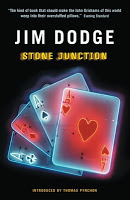 When I first read Dodge's magnum opus — and it is just that; Dodge has only written three books, none since SJ, and I hereby plead with Mr. Dodge to pick up the pen again — I was still a young lad, somewhat well-read but on the whole ignorant. Since that initial reading I have become more familiar and conversant with the historical peers to Dodge's free-wheeling prose and plot style. Pynchon, Tom Robbins, Richard Brautigan; writers of serio-comic fiction who quirkily explore philosophical themes with narratives that careen, bounce, and fly according to the meta-manic whims of the creator. Every character is provided a history, even the minor ones, and they all have a story to tell in flamboyant language that reads wonderfully and would be impossible to maintain in real life. Some people find these authors' refusal to use one word when ten will do tiresome; I personally love a lengthy sentence, and Dodge is lodged firmly within that genre, although his storytelling a touch more linear.
When I first read Dodge's magnum opus — and it is just that; Dodge has only written three books, none since SJ, and I hereby plead with Mr. Dodge to pick up the pen again — I was still a young lad, somewhat well-read but on the whole ignorant. Since that initial reading I have become more familiar and conversant with the historical peers to Dodge's free-wheeling prose and plot style. Pynchon, Tom Robbins, Richard Brautigan; writers of serio-comic fiction who quirkily explore philosophical themes with narratives that careen, bounce, and fly according to the meta-manic whims of the creator. Every character is provided a history, even the minor ones, and they all have a story to tell in flamboyant language that reads wonderfully and would be impossible to maintain in real life. Some people find these authors' refusal to use one word when ten will do tiresome; I personally love a lengthy sentence, and Dodge is lodged firmly within that genre, although his storytelling a touch more linear."Outlaws only do wrong when they feel it's right: criminals only feel right when they're doing wrong." That's a primary theme here; this is an excursion to the land of people on the fringes, people who cannot abide rules and regulations, but mean no harm. People named Longshot, and Volta, and Smiling Jack, Bad Bobby, Red Freddie, and Bridget Bardo. It's an adventurous bildungsroman of Daniel Pearce's birth, life, and eventual *removed for spoiler purposes*. It's a search for meaning, a quest for what the heart truly wants. And when Daniel learns to vanish, it becomes something even greater, pushing into magical realism.
Look, I can't pretend to fully understand what happens to Daniel. All I really know is that I loved the ride. Stone Junction is one of those rare novels that I don't want to end; I want to continue on in my relationships with Dolly, and Aunt Charmaine, and Wild Bill, and Shamus. My heart broke at Daniel's ultimate end, but the finale is the right one. It is ultimately unfair to me that Dodge's world does not exist, as I cannot imagine it wouldn't improve our world tremendously.
Verdict: still a favourite monkey
Published on January 22, 2012 11:32
January 15, 2012
Tiny monkey - Butterfly Winter by W.P. Kinsella
 Butterfly Winter (Enfield & Wizenty, 2011)by W.P. KinsellaDescription (from the publisher)
Butterfly Winter (Enfield & Wizenty, 2011)by W.P. KinsellaDescription (from the publisher)Butterfly Winter, Kinsella's first novel in 13 years, is the story of Julio and Esteban Pimental, twins whose divine destiny for baseball begins with games of catch in the womb. They mature quickly and by the age of ten they leave their home in the fictional Caribbean country of Courteguay for the American major leagues. Julio is a winning pitcher who will only throw to his catcher brother, much to the chagrin of the team that employs him, which must keep mediocre esteban on the roster. events in the brothers' homeland, including regular coups and the outlawing of baseball, continue to shape their lives. They are monitored by the wizard, a mysterious figure who travels by hot air balloon and controls events behind the scenes. In his last years he tells the story of the twins and their family to a skeptical 'gringo' journalist. Butterfly Winter is entertaining, funny and magical, and includes a diabolical chiropractor, a great love blessed by butterflies and a deep political undercurrent that unites the wealthy north with the baseball-loving and oppressed south.
 What the Tiny Monkey thinks
What the Tiny Monkey thinks
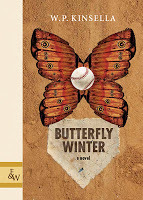 Why the return of W.P. Kinsella wasn't heralded throughout the northern kingdom with hosannas and blaring trumpets I will never understand. Considering that the once-prolific author had claimed his career was over after a severe car crash left him unable to write, the printed return of Kinsella to his three loves (baseball, magic realism, and more baseball) should have been front-page news. Instead, Butterfly Winter slips onto the shelves unnoticed, released by a small independent publisher to a few good reviews. This must be rectified. Kinsella, in addition to being the finest writer there is or ever was of baseball lore (and this coming from an avowed sports unenthusiast), is one of the last true practitioners of the free-wheeling comedic plot practised and perfected by Tom Robbins, Jim Dodge, Edward Abbey, and Richard Brautigan. True to form, Butterfly Winter is a breezy treat, a magical journey to a land where lying is the norm and you can never be sure of the truth. Butterfly doesn't hang together as well as Kinsella's masterpiece
The Iowa Baseball Confederacy
; its episodic nature and refusal to be tied down to a linear plotline can frustrate. Kinsella's enthusiasm and sheer joy at writing smooth over the rough spots, and if the result isn't the sum total of the parts, well, the parts sure are fine all by themselves. It's good to have W.P. back, and like the best of friendships, I hope he'll stick around.
Why the return of W.P. Kinsella wasn't heralded throughout the northern kingdom with hosannas and blaring trumpets I will never understand. Considering that the once-prolific author had claimed his career was over after a severe car crash left him unable to write, the printed return of Kinsella to his three loves (baseball, magic realism, and more baseball) should have been front-page news. Instead, Butterfly Winter slips onto the shelves unnoticed, released by a small independent publisher to a few good reviews. This must be rectified. Kinsella, in addition to being the finest writer there is or ever was of baseball lore (and this coming from an avowed sports unenthusiast), is one of the last true practitioners of the free-wheeling comedic plot practised and perfected by Tom Robbins, Jim Dodge, Edward Abbey, and Richard Brautigan. True to form, Butterfly Winter is a breezy treat, a magical journey to a land where lying is the norm and you can never be sure of the truth. Butterfly doesn't hang together as well as Kinsella's masterpiece
The Iowa Baseball Confederacy
; its episodic nature and refusal to be tied down to a linear plotline can frustrate. Kinsella's enthusiasm and sheer joy at writing smooth over the rough spots, and if the result isn't the sum total of the parts, well, the parts sure are fine all by themselves. It's good to have W.P. back, and like the best of friendships, I hope he'll stick around.TINY MONKEY REALLY LIKES
Published on January 15, 2012 10:32
January 10, 2012
Monkey droppings - Every Shallow Cut by Tom Piccirilli: "You're going to hurt yourself or someone else very badly."
Today, the monkey swings in on a vine of happiness, and swings back out on a rope festooned with hooks and blades.
So, ouch. Be careful, everyone. This one is going to leave scars.
Every Shallow Cut (ChiZine, 2011)
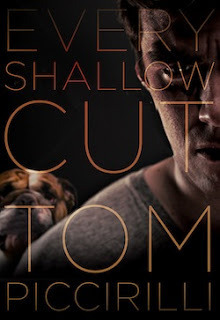 by Tom Piccirilli
by Tom Piccirilli
Brutal, yes. Violent, sometimes. Unforgiving, oh yes, and spilling over with despair. It may be one of the finest literary recreations of depression I've come across. As the title implies, every sentence is a razor, every word a shearing of flesh from meat. Every Shallow Cut is a nightmare of urban angst, the terror of losing everything to faceless banks and sneering creditors. At its essence, in its tone and style, it reminds me of nothing so much as the brilliantly unsentimental work of Jim Thompson (an author who knew his way around insanity).
But is it special? With a capital S. If I'd read it three days sooner, it would have been in my top reads of 2011.
The nameless narrator is a crime writer, once one of some renown, as references to critical acclaim and awards fill the scant exposition. Time has not been kind, and he is now down to his last dollar, with his wife gone, his career in shambles, his house repossessed, and him living in his car with his faithful bulldog Churchill. He is truly living out the death by a thousand cuts,and if this story is at all biographical, we're lucky not to be reading about Piccirilli on the front pages of the tabloids, or the imprinting of a headstone.
Piccirilli begins his saga at the lowest of low points, finding his hero being gleefully stomped by hooligans outside a pawn shop. But if luck has fled his life, resourcefulness hasn't, and after dispatching with the hoods he sells the last of his belongings, purchases a gun, and heads out on the road to...
To where? That's the fun (if we can call it that), as Piccirilli keeps taking left turns. The cover and bumpf led me to believe that this was an ultraviolent Natural Born Killers scenario, a man pushed too far, Death Wish in a car, that sort of thing. And I would have been fine and dandy with that, I love a revenge fantasy as much as everyone, and the author plainly has the chops to make that work; his prose is stripped of elegance and refinement, so unadorned it makes Elmore Leonard seem like a crafter of purple prose. But Piccirilli — an author I am unfamiliar with, an oversight I will definitely rectify — elegantly crafts his story into an examination of despair. It becomes a modern-day retelling of the Job myth, although God finally eased up on the pains with Job. Piccirilli is not so kind as to offer a way out.
Every Shallow Cut keeps the reader eternally on edge. There are no names to these characters save Churchill, no signposts to help the reader keep his balance. The narrator has no connection to the people he meets along the way. They are only "my brother," "my agent," "my pal." Only Churchill reaches through the emotional vacuum and makes a connection. He cannot even connect with his writing, as he compulsively fills notebooks with a story his pal calls his best, yet he has no memory of writing. As he goes from person to person, the elements of himself are sliced off as fat off a roast, leaving only a nub of gristle and bone to take the reader into that darkest of dark places. The last few pages are as bleak, suspenseful, and swimming with misery as any I've read.
But I fear I've scared you off. And maybe that's for the best. The thrills of Every Shallow Cut are not those that can be easily shaken off. These are not funhouse horrors; this is the sickening vortex of mental collapse, a slurry of paranoia, self-pity, unfocused rage, and unremitting sadness. I'm almost afraid to read more Piccirilli; not because of the terrors I'm sure he can conjure, but because I don't know if he could ever top this. I hope he tries, though.
VERDICT: MONKEY LOVES
P.S. This is another substantially amazing release from ChiZine, a Canadian publisher who has made a deal with Satan to produce the greatest genre fiction out there today. If you haven't read ChiZine yet, you haven't lived.
So, ouch. Be careful, everyone. This one is going to leave scars.
Every Shallow Cut (ChiZine, 2011)
 by Tom Piccirilli
by Tom PiccirilliThey opened the car door and Churchill hit the ground beside me with a thirty-five pound belly-flop. Our gazes met and he gave me such a look of confusion and unconditional love that a sob welled in my chest and nearly broke from my throat. He snuffled at my neck and licked me twice and they went for the keys in my pocket and Churchill went for their ankles.Every Shallow Cut was released in 2011, but I didn't get to crack open its cover until one dreary day early in 2012. The next few hours were a blur, and when I closed the covers again, I knew I had just experienced something very special.
I had a flash, almost a premonition, where I saw that here it was, my very worst moment in a long chain of very worst moments, where I was going to have to watch them kick my dog to death. It was worse than my wife leaving me, it was worse than losing the house, it was worse than visiting the graves of my parents. It was going to be nearly as bad as the day I'd passed wailing protesters at Planned Parenthood following my wife's staunch shoulders across the lot. They'd break Churchill's back, boot him into the gutter, dance off with my father's coins, and drive away in my car.
Church growled and hung onto an ankle, and the guy tried to shake him and bitched, "Fucking fat dog piece of shit!" His partners found it funny and started to laugh. I got to my knees and then to my feet, and I remembered that I was a man with nothing left who wrote stories about men with nothing left who did ungodly acts of violence against each other.
I wrote from the safety of a desk but the dark cellar door of my failures had opened and called me through it, and I found all my urgent whispering pain and hate, and I laughed again and they turned to look at me and I went to work.
Brutal, yes. Violent, sometimes. Unforgiving, oh yes, and spilling over with despair. It may be one of the finest literary recreations of depression I've come across. As the title implies, every sentence is a razor, every word a shearing of flesh from meat. Every Shallow Cut is a nightmare of urban angst, the terror of losing everything to faceless banks and sneering creditors. At its essence, in its tone and style, it reminds me of nothing so much as the brilliantly unsentimental work of Jim Thompson (an author who knew his way around insanity).
But is it special? With a capital S. If I'd read it three days sooner, it would have been in my top reads of 2011.
The nameless narrator is a crime writer, once one of some renown, as references to critical acclaim and awards fill the scant exposition. Time has not been kind, and he is now down to his last dollar, with his wife gone, his career in shambles, his house repossessed, and him living in his car with his faithful bulldog Churchill. He is truly living out the death by a thousand cuts,and if this story is at all biographical, we're lucky not to be reading about Piccirilli on the front pages of the tabloids, or the imprinting of a headstone.
Piccirilli begins his saga at the lowest of low points, finding his hero being gleefully stomped by hooligans outside a pawn shop. But if luck has fled his life, resourcefulness hasn't, and after dispatching with the hoods he sells the last of his belongings, purchases a gun, and heads out on the road to...
To where? That's the fun (if we can call it that), as Piccirilli keeps taking left turns. The cover and bumpf led me to believe that this was an ultraviolent Natural Born Killers scenario, a man pushed too far, Death Wish in a car, that sort of thing. And I would have been fine and dandy with that, I love a revenge fantasy as much as everyone, and the author plainly has the chops to make that work; his prose is stripped of elegance and refinement, so unadorned it makes Elmore Leonard seem like a crafter of purple prose. But Piccirilli — an author I am unfamiliar with, an oversight I will definitely rectify — elegantly crafts his story into an examination of despair. It becomes a modern-day retelling of the Job myth, although God finally eased up on the pains with Job. Piccirilli is not so kind as to offer a way out.
Every Shallow Cut keeps the reader eternally on edge. There are no names to these characters save Churchill, no signposts to help the reader keep his balance. The narrator has no connection to the people he meets along the way. They are only "my brother," "my agent," "my pal." Only Churchill reaches through the emotional vacuum and makes a connection. He cannot even connect with his writing, as he compulsively fills notebooks with a story his pal calls his best, yet he has no memory of writing. As he goes from person to person, the elements of himself are sliced off as fat off a roast, leaving only a nub of gristle and bone to take the reader into that darkest of dark places. The last few pages are as bleak, suspenseful, and swimming with misery as any I've read.
But I fear I've scared you off. And maybe that's for the best. The thrills of Every Shallow Cut are not those that can be easily shaken off. These are not funhouse horrors; this is the sickening vortex of mental collapse, a slurry of paranoia, self-pity, unfocused rage, and unremitting sadness. I'm almost afraid to read more Piccirilli; not because of the terrors I'm sure he can conjure, but because I don't know if he could ever top this. I hope he tries, though.
VERDICT: MONKEY LOVES
P.S. This is another substantially amazing release from ChiZine, a Canadian publisher who has made a deal with Satan to produce the greatest genre fiction out there today. If you haven't read ChiZine yet, you haven't lived.
Published on January 10, 2012 17:01
January 8, 2012
What to expect in 2012 (before the endtimes commeth, of course)
 There are two ways to go in 2012, as I see it.
There are two ways to go in 2012, as I see it.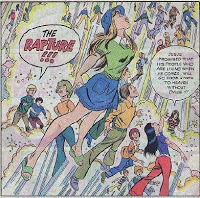 Succumb to Fox News hysteria, dig myself a large hole in my backyard, line it with concrete, make a bulk run to Costco, and hole up with piles of Glenn Beck/Ron Paul literature to wait out the 2012 Mayan apocalypse, only venturing forth to meet our inevitable alien overlords when I can reasonably expect to assert my new position as king of the mole people (after I've battled and vanquished Pat Robertson for the title); or as I've already survived two (2!) raptures in 2011 using nothing but cynicism and common sense, consider myself well-nigh argmageddon-proof, and soldier on.As per usual, the answer lies somewhere in-between (although if we were scaling this on a horizontal line, I'd definitely fall far closer to option 2).
Succumb to Fox News hysteria, dig myself a large hole in my backyard, line it with concrete, make a bulk run to Costco, and hole up with piles of Glenn Beck/Ron Paul literature to wait out the 2012 Mayan apocalypse, only venturing forth to meet our inevitable alien overlords when I can reasonably expect to assert my new position as king of the mole people (after I've battled and vanquished Pat Robertson for the title); or as I've already survived two (2!) raptures in 2011 using nothing but cynicism and common sense, consider myself well-nigh argmageddon-proof, and soldier on.As per usual, the answer lies somewhere in-between (although if we were scaling this on a horizontal line, I'd definitely fall far closer to option 2).2011 was a busy year for me. I read voraciously, watched movies fanatically, finished and submitted a new manuscript, went to work every day, and even started working out on a semi-regular basis. Now, having surpassed 100 books read and achieving a personal best of 25 push-ups in a row without vomiting, I look at my 2012 prospects and get instantly fatigued.
 First, I'm going to divide myself in two, Internetally-speaking. Shelf-monkey.blogspot.com was initially intended to promote the publications of my debut novel (coincidentally titled
Shelf Monkey
), but has somewhere along the line transformed itself into more of an all-purpose literary review site. Not that I'm complaining, the site has kept me sane for some time, and has fostered an unexpected ability to gain free books for review purposes. Yet now, with the impending release of my sophomore effort
Husk
, I have decided to create a new site devoted entirely to my personal efforts, and leave Shelf Monkey (the blog) open as a continuing review site for whatever books and occasional movies capture my fancy. The new site is still a work in progress, but it's a public one, and I hope that you'll bookmark www.coreyredekop.ca and visit regularly for news and events relating to Corey Redekop the professional author. I've already imported most of my blogposts from here that relate to me, me, me, and the site is only going to get bigger when I win the Giller (*not a guarantee).
First, I'm going to divide myself in two, Internetally-speaking. Shelf-monkey.blogspot.com was initially intended to promote the publications of my debut novel (coincidentally titled
Shelf Monkey
), but has somewhere along the line transformed itself into more of an all-purpose literary review site. Not that I'm complaining, the site has kept me sane for some time, and has fostered an unexpected ability to gain free books for review purposes. Yet now, with the impending release of my sophomore effort
Husk
, I have decided to create a new site devoted entirely to my personal efforts, and leave Shelf Monkey (the blog) open as a continuing review site for whatever books and occasional movies capture my fancy. The new site is still a work in progress, but it's a public one, and I hope that you'll bookmark www.coreyredekop.ca and visit regularly for news and events relating to Corey Redekop the professional author. I've already imported most of my blogposts from here that relate to me, me, me, and the site is only going to get bigger when I win the Giller (*not a guarantee). So shelf-monkey.blogspot.com will now solely become a review site, one I maintain purely for personal reasons. I like books, I like talking about books, I like recommending books, and occasionally I like trashing books. I'll be streamlining this site somewhat, ridding the blog of certain posts, perhaps altering the look. But rest assured, the content will be of the same middling calibre you've come to expect and tolerate from a low-rent Canadian author such as yours truly. I'll make occasional cross-over posts, but I feel I need to separate the professional me from the blogger me. This new blogger-me will be known online as Tasha Chestnut (not really).
 But what about reading in 2012, Corey? What will you read? What will you review? How can we be expected to live out our normal lives not knowing your every move?
But what about reading in 2012, Corey? What will you read? What will you review? How can we be expected to live out our normal lives not knowing your every move?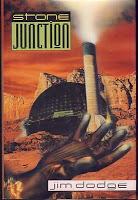 I think I'll cut back. I went for broke last year, and while I don't regret it, I didn't stop and smell the pages enough. So while I'm going to still read new books and review them (hopefully more regularly than of late), I'm planning to go back to my stacks and luxuriate in some past favourites. Rereading a novel is always a treat, because while the book has not changed, the reader has. I've already gained new insights into Jim Dodge's
Stone Junction
. I was in my mid-twenties when I first read it (taken from a bargain bin on a whim, became one of my absolute favourites, don't you love it when that happens?), and while I fell in love instantly, I lacked the knowledge to judge it on more than surface grounds. Now, a lifetime later, I am catching the freewheeling seeds of its progenitors in the text, the styles of Tom Robbins, Thomas Pynchon, Kurt Vonnegut, and Richard Brautigan that were unknown to me at the time, but have since served to evolve my personality.
I think I'll cut back. I went for broke last year, and while I don't regret it, I didn't stop and smell the pages enough. So while I'm going to still read new books and review them (hopefully more regularly than of late), I'm planning to go back to my stacks and luxuriate in some past favourites. Rereading a novel is always a treat, because while the book has not changed, the reader has. I've already gained new insights into Jim Dodge's
Stone Junction
. I was in my mid-twenties when I first read it (taken from a bargain bin on a whim, became one of my absolute favourites, don't you love it when that happens?), and while I fell in love instantly, I lacked the knowledge to judge it on more than surface grounds. Now, a lifetime later, I am catching the freewheeling seeds of its progenitors in the text, the styles of Tom Robbins, Thomas Pynchon, Kurt Vonnegut, and Richard Brautigan that were unknown to me at the time, but have since served to evolve my personality.After Stone Junction, I'm going to dance my fingers across the shelves and see what strikes my fancy. I've already put aside The World According to Garp (I estimate I've read this ten times already), The Iowa Baseball Confederacy (estimate: six times), Henderson the Rain King (four), and Do Androids Dream of Electric Sheep? (twelve). Perhaps I'll make a contest of it, a la my past Critical Monkey series devoted to the novels we were all avoiding. Haven't decided yet, although I will review them all here.
And beyond that, who knows? There's a cornucopia of awesomeness always on the horizon, some with buzz, some surprises. I've already read a few upcoming releases (a perk of the position), and while I won't review them yet, I will say keep a close eye out for Christopher Meades' The Last Hiccup and Scott Fotheringham's The Rest is Silence.
So bring it on, 2012! Ancient Mayans be damned! We have nothing to fear but fear itself, and the 2012 general U.S. election!
Published on January 08, 2012 12:04
January 1, 2012
2011 in review, book-wise
Ah, 2011. It seems like you just ended yesterday.
First, I'd like to again apologize for not keeping up the reviews like I should. I've had a few personal projects on the go, and I hope to return to a more regular output in 2012. This site may alter itself somewhat, but the reviews will continue.
But now, in lieu of said incisive literary commentary, I've had a close gander at what I've read over the course of the past 365 days, and I thought it would be a good time to bring the whole thing out into the open for a year-end Best Of list (the reason the Internet was created!).
In 2011, I reached what is probably a personal milestone: 107 books read from cover to cover. I'm not sure when the last time I broke three digits was, but I was likely still in short pants. So, pre-2006. That's a lot of books, and going over them, I've had quite a good year. In 2010 I was intentionally hurting myself through a masochistic desire to read books almost destined to grate on me like steel wool against bare flesh (I weirdly miss the nad-shrinking prose of Chuck Norris, James Patterson, and Stephanie Meyer; what does that say about me?). 2011, I went with what I wanted to read, which was not only more soothing to the soul, but also lent me quite a large list of recommendations today.
So below is a sizable list, divided into sections for easy consumption. I have not paid attention to year of publication, and I have ignored books I reread. I've bolded those I've reviewed.
Favourite books of the year: The Sisters Brothers (2011), Patrick DeWitt A Book of Tongues (2010), A Rope of Thorns (2011), Gemma Files Room (2010), Emma Donoghue The Time We All Went Marching (2011), Arley McNeneyCity of Truth (1990), James Morrow Idaho Winter (2011), Tony Burgess The Magician King (2011), Lev Grossman The Blue Light Project (2011), Timothy Taylor An Ordinary Decent Criminal (2005), Your Friendly Neighbourhood Criminal (2008), Michael Van Rooy Novels I'd read again in a second:
Curiosity (2010), Joan Thomas Drive-by Saviours (2010), Chris Benjamin Kalila (2011), Rosemary Nixon Tide Road (2011), Valerie Compton The Guardians (2011), Andrew Pyper Because I Have Loved and Hidden It (2009), Elise Moser Sarah Court (2010), Craig Davidson The Three Fates of Henrik Nordmark (2010), Christopher MeadesThe Town that Drowned (2011), Riel Nason Major Karnage (2010), Gord ZajacAnnabel (2010), Kathleen WinterOne of Our Thursdays is Missing (2011), Jasper Fforde Low Town (2011), Daniel Polansky The Island of Doctor Moreau (1897), H.G. Wells The Canterbury Trail (2011), Angie Abdou The Bookman (2010), Camera Obscura (2011), Lavie Tidhar Beauty Plus Pity (2011), Kevin Chong John Dies at the End (2009), David Wong The Alchemists of Kush (2011), Minister FaustButterfly Winter (2011), W.P. Kinsella Chasing the Dragon (2009), Nicholas KaufmanAmerican Desert (2004), Percival Everett True Grit (1968), Charles Portis This Hidden Thing (2010), Dora DueckJesus and the Eightfold Path (2011), Lavie Tidhar Spectacular short fiction:
This Cake is for the Party (2010), Sarah Selecky Light Lifting (2010), Alexander McLeod Crisp (2010), R.W. Gray The Thackery T. Lambshead Cabinet of Curiosities (2011), Ann & Jeff Vandermeer (eds.) The Hair Wreath and Other Stories (2010) - Halli Villegas Steampunk II: Steampunk Reloaded (2011), Ann & Jeff Vandermeer (eds.) The Urban Fantasy Anthology (2011), Peter S. Beagle & Joe R. Lansdale (eds.) Great titles:
Jesus and the Eightfold Path (2011), Lavie Tidhar John Dies at the End (2009), David Wong Squid Pulp Blues (2008), Jordan Krall The Ass Goblins of Auschwitz (2009), Cameron Pierce Zombie Spaceship Wasteland (2011), Patton Oswalt Why Not a Spider Monkey Jesus? (2010), A.G. Pasquella Major Karnage (2010), Gord Zajac Books that would make awesome movies: Sandman Slim (2009), Richard Kadrey John Dies at the End (2009), David Wong (coming in 2012!) Major Karnage (2010), Gord Zajac The Sisters Brothers (2011), Patrick DeWitt Chasing the Dragon (2009), Nicholas Kaufman Brains (2010), Robin Becker Patient Zero (2009), Jonathan Mayberry Disappointments (not the worst books, just personal disappointment): Damned (2011), Chuck Palahniuk - and that's it for me, I can't take another Palahniuk letdownWet Work (1993), Philip Nutman - heard a lot about it, but it's only okay The Fall (2011), Guillermo Del Toro & Chuck Hogan - it's a fun ride, but nowhere near as scary or suspenseful as some reviewers have said Amnesia Moon (1995), Jonathan Lethem - from Lethem, almost anything not a masterpiece is a disappointment Robopocalypse (2011), Daniel H. Wilson - killer robots should be fun, not boring
Published on January 01, 2012 16:31
December 13, 2011
The monkey gets lazy, and watches a few movies instead of reading
Boy, it has been a while, hasn't it? I have excuse, of course - a new novel, editing, work, a new website - but still, no excuses for not posting.
So, without further ado, I commit the ultimate sin a blogger can commit, and link to other content. Now, the other content is mine, but still...lazy.
The content in question is on the genre film website Flick Attack, where I hurredly muse on some of the great, good, ignored, fairly ignored, and awful movies I've sat through. I've put up a few reviews lately, and I would be remiss if I didn't draw your attention to them.
First up, the high-kicking action of Chuck "The Toilet Brush for a Face" Norris, and his career nadir, Delta Force 2 :

So, without further ado, I commit the ultimate sin a blogger can commit, and link to other content. Now, the other content is mine, but still...lazy.
The content in question is on the genre film website Flick Attack, where I hurredly muse on some of the great, good, ignored, fairly ignored, and awful movies I've sat through. I've put up a few reviews lately, and I would be remiss if I didn't draw your attention to them.
First up, the high-kicking action of Chuck "The Toilet Brush for a Face" Norris, and his career nadir, Delta Force 2 :
Next, we have the guilty pleasure that is Jamie Lee Curtis battling cyborg monsters in Virus :Directed by Aaron Norris (favorite bro of Bristle McSoloflex, and as fine a director as his sib is an actor), Delta Force 2 finds Punch Rockgroin leading some kind of anti-terrorist group, a leader so magnetic that no backstory or character development is necessary. After a friend is killed by Drago, The Beard with No Name works out his rage by kicking the snot out of his men in a training exercise and then traveling to South America for revenge, backed by the U.S. government.
Here's what Virus doesn't have: genuine scares, anything approaching originality, and a director who can do more than aim the camera at the right spot. But when I'm presented with a monster comprised of electrical impulses that replicates itself by combining spare human body parts with mutated versions of the spiderbots that menaced Tom Selleck in Runaway, resulting in awesomely goofy Borg/Cenobite hybrids, I'm willing to forgive a lot.And finally, a movie that earned me much family scorn for enjoying, the b-movie messterpiece Hardware :
I'll get back to reading soon, I promise.It isn't perfect; the script is undercooked, and the tiny budget betrays itself through clumsy action and ersatz effects. But Hardware, love it or hate it, is undeniably a pure product of Stanley's mind, and in an era of generic Platinum Dunes horrors, it's refreshing to see an unwillingness to compromise, even if the result is deeply flawed. Put it this way: If you can find the value of a movie where the hero strides past a baby tied to dead woman's waist without taking a second glance, you'll appreciate Hardware; if not, I'm sure Blockbuster has a copy of Big Momma's House.
Published on December 13, 2011 16:51
November 13, 2011
CANadian literature, Or CAN'Tadian literature? (Boy am I ashamed of that pun)
 Today, the shelf monkey goes all flag-waving and whatnot to answer an age-old question that has tormented Canadian bibliophiles since we first learned to write; what the hell are we reading, anyway?
Today, the shelf monkey goes all flag-waving and whatnot to answer an age-old question that has tormented Canadian bibliophiles since we first learned to write; what the hell are we reading, anyway?There has been a lot of talk/complaining/buzz/whining/questioning/whinging/probing/babbling/hand-wringing/soul-searching/teeth-knashing by persons much smarter than myself lately, as there usually is around award season, as to what exactly constitutes what we refer to as 'Canadian literature' (best exemplified in this Globe and Mail article). Patrick deWitt's The Sisters Brothers , winner of the Governor General's Award for Fiction, and Esi Edugyan's Giller-winning Half Blood Blues have earned some backhanded criticism for winning Canadian awards with stories set in 1800's California and Nazi Germany, respectively.
As I see it, the major questions are:
 Is its being written by a Canadian enough to qualify a book as an example of 'Canadian' literature?Are Canadian writers being appropriately Canadian in their published works? Should 'Canadian' literature have a strictly Canadian setting to qualify as such?How much 'Canadian' content should a book have to qualify as 'Canadian'? What is the proper ratio of beavers and moose per page? Is six enough? I may have made that last one up.There are seemingly no easy answers to this conundrum. What constitutes American literature, or English, or Greek, Polish, Lithuanian, Narnian? Does everything Irish have to come tinged with authentic Roddy Doyle wit? Should American author Annie Proulx's
The Shipping News
, with its Newfoundland setting, qualify as Canadian despite the author's nationality? Does Clive Barker's setting of his horror novel
Cabal
in Alberta disqualify it as an English product? Should we try and convince Howard Norman to accept Canadian citizenship, since most of his novels are set here anyway?
Is its being written by a Canadian enough to qualify a book as an example of 'Canadian' literature?Are Canadian writers being appropriately Canadian in their published works? Should 'Canadian' literature have a strictly Canadian setting to qualify as such?How much 'Canadian' content should a book have to qualify as 'Canadian'? What is the proper ratio of beavers and moose per page? Is six enough? I may have made that last one up.There are seemingly no easy answers to this conundrum. What constitutes American literature, or English, or Greek, Polish, Lithuanian, Narnian? Does everything Irish have to come tinged with authentic Roddy Doyle wit? Should American author Annie Proulx's
The Shipping News
, with its Newfoundland setting, qualify as Canadian despite the author's nationality? Does Clive Barker's setting of his horror novel
Cabal
in Alberta disqualify it as an English product? Should we try and convince Howard Norman to accept Canadian citizenship, since most of his novels are set here anyway?For me, the answer is deceptively simple, as befits my deceptively simple mind: Canadian literature is something written by a Canadian citizen. It matters not its setting, nor subject, nor genre. If you're Canadian, and you've written a novel, short, story, or poem, hey, you're in. Whether or not your work is any good is another matter, best left to wizened reviewers lurking behind their keyboards like trolls beneath a bridge, but as one who harbours an instinctive distrust of those who differentiate between 'literature' and 'fiction', I feel that if we settle on citizenship as a baseline, we'll all be a lot happier.
For some perspective, let's quickly look at some Canadian novels of note:
The English Patient (1992) by Michael Ondaatje - A novel set in wartime Europe, written by a Canadian of Sri Lankan origin. Only a few Canadian characters in a novel rife with many nationalities. Won the Governor General's Award and the Booker. The Life of Pi (2001) by Yann Martel - A novel involving an Indian child trapped at sea with a tiger. The author hails from Saskatchewan. No major Canadian characters of note. Won the Booker and The Hugh MacLennan Award for Fiction, shortlisted for the Governor General's Award.
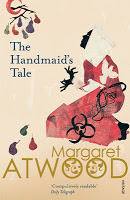 The Handmaid's Tale
(1985) by Margaret Atwood - A dystopian tale of religious patriarchal tyranny set in the fictional Republic of Gilead, located within the borders of the U.S. No Canadians. Written by a Canadian from Ontario. Won the Governor General's Award and the Arthur C. Clarke Award, shortlisted for the Booker.
A Complicated Kindness
(2004) by Miriam Toews - Set in a Mennonite community in Manitoba, a young woman struggles to reconcile her yearnings for more with the regimented religious structure of the township. Written by a Manitoban. Won the Governor General's Award.
A Fine Balance
(1995) by Rohinton Mistry - A story set in India, examining changes in Indian society. No Canadians. Written by an India-born Canadian. Won the Giller, shortlisted for the Booker, and was an Oprah Bookclub Pick.Do you see a connecting theme, other than the awards and acclaim that accompanied each novel? Yeah, me neither. I do know that these all are accepted examples of Canadian Literature, and that, last time I checked, no one was accusing Margaret Atwood of not being Canadian enough (like anyone'd have the balls). And while this ain't near an exhaustive list, I hereby, in my accepted roll as legally accepted arbitrator of all things Canadian (it's true, don't dispute me!), claim that there is no single accepted definition of a 'Canadian' novel. And excepting only the caveat that the author must have some sort of Canadian citizenship, nor should there be (gasps from the gallery!).
The Handmaid's Tale
(1985) by Margaret Atwood - A dystopian tale of religious patriarchal tyranny set in the fictional Republic of Gilead, located within the borders of the U.S. No Canadians. Written by a Canadian from Ontario. Won the Governor General's Award and the Arthur C. Clarke Award, shortlisted for the Booker.
A Complicated Kindness
(2004) by Miriam Toews - Set in a Mennonite community in Manitoba, a young woman struggles to reconcile her yearnings for more with the regimented religious structure of the township. Written by a Manitoban. Won the Governor General's Award.
A Fine Balance
(1995) by Rohinton Mistry - A story set in India, examining changes in Indian society. No Canadians. Written by an India-born Canadian. Won the Giller, shortlisted for the Booker, and was an Oprah Bookclub Pick.Do you see a connecting theme, other than the awards and acclaim that accompanied each novel? Yeah, me neither. I do know that these all are accepted examples of Canadian Literature, and that, last time I checked, no one was accusing Margaret Atwood of not being Canadian enough (like anyone'd have the balls). And while this ain't near an exhaustive list, I hereby, in my accepted roll as legally accepted arbitrator of all things Canadian (it's true, don't dispute me!), claim that there is no single accepted definition of a 'Canadian' novel. And excepting only the caveat that the author must have some sort of Canadian citizenship, nor should there be (gasps from the gallery!).Look, anyone who wants to write about Canada will write about Canada, that has never been a problem. Whether it be a tale of the immigrant experience ( The Amazing Absorbing Boy ), a trip backwards through time to uncover new facets of our shared history ( The Time We All Went Marching ), a legal thriller ( Old City Hall ), or an africentric sci-fi/fantasy adventure ( The Coyote Kings of the Space-Age Bachelor Pad ), Canadian authors will always set novels in Canada, covering themes and genres both classic and modern. I don't think we'll have to worry if, one year, we don't get enough novels about Canadian settlers braving the elements and/or frostbite. Somehow, we will survive as a culture.
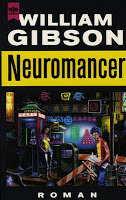
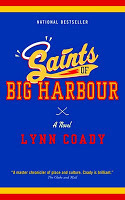 But if we start (or continue) to argue that classifiable CanLit must adhere to certain standards, we risk alienating the artists we rely upon to create things for us to argue over. It is a well-worn trope that 'Canadian Literature' is viewed as being about history, and the prairies, and hard-scrabble lives, and fighting the elements. Indeed, it is precisely that form of literature (as fine as some of its novels may be) that drive people scarred from middle-school attempts to form them into functioning Canadians by having them read
Who Has Seen the Wind?
and
The Stone Angel
to make sweeping statements such as, "I never read Canadian fiction." This has been uttered to me by many people over the years, and none of my attempts to remind them of the works of Robert Sawyer, Will Ferguson, Timothy Findley, Minister Faust, Nalo Hopkinson, Thomas King, W.P. Kinsella, Timothy Taylor, Lynn Coady, Cory Doctorow, William Gibson, Michael Winter, or Spider Robinson will dissuade them from their opinion. And if they somehow have read these authors, or countless others, they will wave they hands dismissively and comment that these authors do not count as Canadian Literature, because they are entertaining, which is a state of being anathema to 'true' Canadian literature.
But if we start (or continue) to argue that classifiable CanLit must adhere to certain standards, we risk alienating the artists we rely upon to create things for us to argue over. It is a well-worn trope that 'Canadian Literature' is viewed as being about history, and the prairies, and hard-scrabble lives, and fighting the elements. Indeed, it is precisely that form of literature (as fine as some of its novels may be) that drive people scarred from middle-school attempts to form them into functioning Canadians by having them read
Who Has Seen the Wind?
and
The Stone Angel
to make sweeping statements such as, "I never read Canadian fiction." This has been uttered to me by many people over the years, and none of my attempts to remind them of the works of Robert Sawyer, Will Ferguson, Timothy Findley, Minister Faust, Nalo Hopkinson, Thomas King, W.P. Kinsella, Timothy Taylor, Lynn Coady, Cory Doctorow, William Gibson, Michael Winter, or Spider Robinson will dissuade them from their opinion. And if they somehow have read these authors, or countless others, they will wave they hands dismissively and comment that these authors do not count as Canadian Literature, because they are entertaining, which is a state of being anathema to 'true' Canadian literature.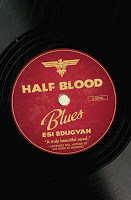 I have shouted myself hoarse at these people to no effect save restraining orders. I ain't proud of making a public spectacle of myself, but I would bristle and scream to the heavens and tear down walls with the force of my umbrage if anyone dared say to me that my work isn't Canadian Literature. You can call it sloppy, call it juvenile, call it a left-wing screed, call it just plain bad, but don't you dare question its nationality.
I have shouted myself hoarse at these people to no effect save restraining orders. I ain't proud of making a public spectacle of myself, but I would bristle and scream to the heavens and tear down walls with the force of my umbrage if anyone dared say to me that my work isn't Canadian Literature. You can call it sloppy, call it juvenile, call it a left-wing screed, call it just plain bad, but don't you dare question its nationality.So I applaud this year's multiple awards for The Sisters Brothers and Half Blood Blues, for continuing the tradition (as evidenced above) of Canadian citizens writing about whatever pleases them and letting the awards fall where they may. Because for me, this is proof of a prime Canadian trait: accepting and rewarding others for who and what they are, rather than what we may wish they were.
Published on November 13, 2011 10:36
October 30, 2011
The Shelf Monkey branches out to criticize more of the pop culture arts
I thought I should take a moment to digress from my prepared remarks (something about the 'death of books' or something, I can't read my writing. Probably not important.) to let you know of a fairly new venture I've recently been participating in.

I've been following the movie review site Flick Attack —its motto: hitting you with one random movie a day . . . whether you like it or not—since it debuted a number of months ago. Its creator, Rod Lott, was one of my first boosters when his site Bookgasm gave Shelf Monkey a sterling review, and we've remained in contact ever since, through the usual social medias that serve to distract us from the horrors of everyday life.
Flick Attack is decidedly irreverent, with short, snappy reviews of any movie Rod and his cadre of reviewers happen to see, spanning the gamut from blockbuster hits to obscure D-movies, from Rambo to The Black Belly of the Tarantula to The Incredible Hulk Returns . It's a great site to discover true cinematic surprises and re-evaluations of past hits and flops.
Speaking of flops, I chose as my debut to tackle the Tobe Hooper weirdfest Lifeforce , one of my personal favourites, as it's practically five movies in one (which saves me all kinds of time.)
Here's a taste:


I've been following the movie review site Flick Attack —its motto: hitting you with one random movie a day . . . whether you like it or not—since it debuted a number of months ago. Its creator, Rod Lott, was one of my first boosters when his site Bookgasm gave Shelf Monkey a sterling review, and we've remained in contact ever since, through the usual social medias that serve to distract us from the horrors of everyday life.
Flick Attack is decidedly irreverent, with short, snappy reviews of any movie Rod and his cadre of reviewers happen to see, spanning the gamut from blockbuster hits to obscure D-movies, from Rambo to The Black Belly of the Tarantula to The Incredible Hulk Returns . It's a great site to discover true cinematic surprises and re-evaluations of past hits and flops.
Speaking of flops, I chose as my debut to tackle the Tobe Hooper weirdfest Lifeforce , one of my personal favourites, as it's practically five movies in one (which saves me all kinds of time.)
Here's a taste:
Click here to check out the rest of the review, and I'll be updating the site with further reviews when they're online. Next up: the superb British werewolf movie Dog Soldiers !Cannon Films clearly didn't know what it had signed on for. Lifeforce flopped, with reviews generally negative or worse (although Gene Siskel liked it). But aided through hindsight and extended editions, Lifeforce is a geek classic. Certainly no one involved phoned it in; Hooper's direction (never better) captures the style and dry wit of the classic Hammer Quatermass films (well worth checking out), the score by Henry Mancini (!) is appropriately quirky and bombastic, and John Dykstra's (Star Wars) special effects are superb — the desiccated zombie design is wonderful, and the alien spacecraft is a thing of beauty. No CGI here, just craft and skill.
Published on October 30, 2011 11:21



